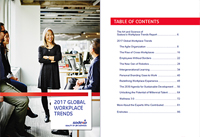A Misunderstood Generation: reinterpreting what it means to be a millennial
Interview with Crystal Kadakia, speaker, author, thought leader, and consultant.
 Sodexo’s 2017 Workplace Trends Report is hot off the press with 10 major trends that will impact our workplace today and in the years to come. Today we sat down with Crystal Kadakia, speaker, author, thought leader, and consultant, to get her take on millennials in the workplace.
Sodexo’s 2017 Workplace Trends Report is hot off the press with 10 major trends that will impact our workplace today and in the years to come. Today we sat down with Crystal Kadakia, speaker, author, thought leader, and consultant, to get her take on millennials in the workplace.
What inspired you to write The Millennial Myth: Transforming Misunderstanding into Workplace Breakthroughs?
Crystal Kadakia: Around five years ago, I started hearing a lot about millennials. At the time, I was at a Fortune 100 company designing training for new hires at a global level. I remember thinking that the stereotypes didn’t line up with what I was seeing in the workplace. As a millennial myself, I became very interested and started doing some of my own research, which eventually led to me start my own company, Invati Consulting. We research different millennial trends and stereotypes and look at where these trends intersect with workplace culture. The millennial topic resonates really well with a lot of people because many are really confused about generations. It’s a very polarizing topic and a lot of people feel like they can’t work with “kids these days”.
The way I see it, there’s got to be a different way to think about millennials other than what is typically represented in the media – for example, articles such as Top 10 Reasons Why We Hate Working with Millennials. In trying to grow awareness around these ideas, it really sparked me to write The Millennial Myth. The book focuses on five of the most common stereotypes and finds a modern interpretation.
Can you provide an example of one of these myths?
C.K.: A major millennial myth that I address in my book is that millennials are lazy. But they aren’t, they are just redefining productivity. Consider that when today’s twenty-somethings were students they succeeded by becoming digital experts – they learned how to work anywhere and at any time that was most productive for them. They figured out their personal productivity tools. And when they came into the workplace, there was this huge expectation that they could still use their own means of personal productivity, versus following the guidelines set by someone else. This is really where the conversations around working from home or flex schedules and the idea of work-life integration came into play. In the traditional mindset, this appears to be lazy and unwilling to do the work. In the modern mindset, this is the way that work gets done in a digital world.
Digital seems to have defined millennials in many ways – do you agree?
C.K.: The advent of digital technology is one of the key differences with millennials – they are literally the last generation to remember what the world was like without the internet. As such, millennial traits tend to stem from looking back at the impact of digital as they were growing up as well as their expectations in the workplace. Digital has caused globalization and it has impacted how we all work. Millennials are a very pivotal generation because we can study what life was like before the internet and what life was like after. But most folks aren’t doing that – because they are hung up on the biased, stereotypical view of millennials.
Broadly speaking, how do you think millennials have transformed the workplace?
C.K.: I think the workplace is still so boomer-heavy that a lot of these transformations and trends are still hanging in the air. We will only see if it actually takes hold when Gen Z enters and more boomers start to retire. There is also such a negative perception about millennials and until we manage to shed this negativity, we can’t make the real transformations that need to be made. We need to go back and question these stereotypes. This is really what my research and book addresses, because that’s the starting point: we need to transform those misunderstandings and then reestablish effective, modern workplace changes.
What are the implications of the arrival of Gen Z in the workplace? Will this generation reinforce the trends that millennials have started to create?
C.K.: Today, 30 percent of millennials are already in management positions. It’s funny, because as millennials become managers, some of the traits that bothered boomers and Gen X also start to bother millennials themselves. I’ve had millennial managers call me saying when I was a millennial employee this was all well and good, but now as a manager I’m starting to struggle.
At the same time, at an organizational level we haven’t yet figured out how to modernize the work culture based on changing digital behaviors. Until we figure this out, we’re going to see similar expectations and lack of engagement and lack of retention from Gen Z.
Any advice for employers in regards to managing a multigenerational workforce?
C.K.: We are very contradictory in the workplace. On one hand, leaders want to attract and retain the best and brightest millennials; but on the other hand, many categorize the entire generation as lazy and entitled. But no millennial wants to work for a company that thinks they are lazy and entitled. So my best counsel is to remove that contradiction altogether and make sure you are transparent about your goals to modernize the workplace, not just for millennials but for everyone working in the digitally-enabled word. I am convinced that you cannot hold a negative stereotype and want to do positive things with it, it’s an inherent contradiction. Until we address these stereotypes, we can’t really move forward in a discussion about workplace trends.
The Millennial Myth is available for pre-purchase or to learn more, head to themillennialmyth.com


